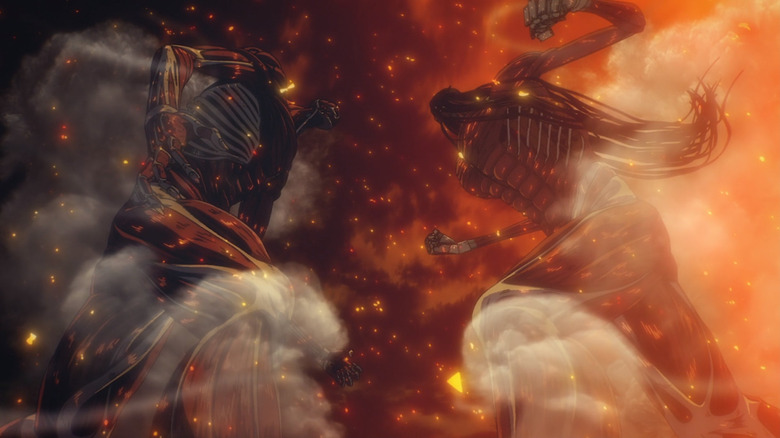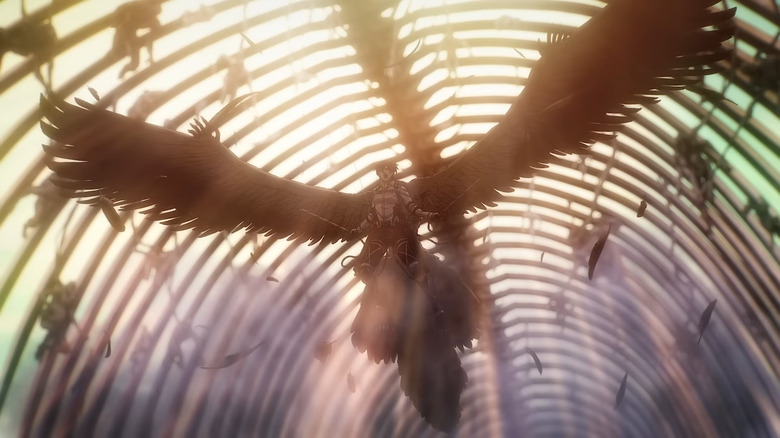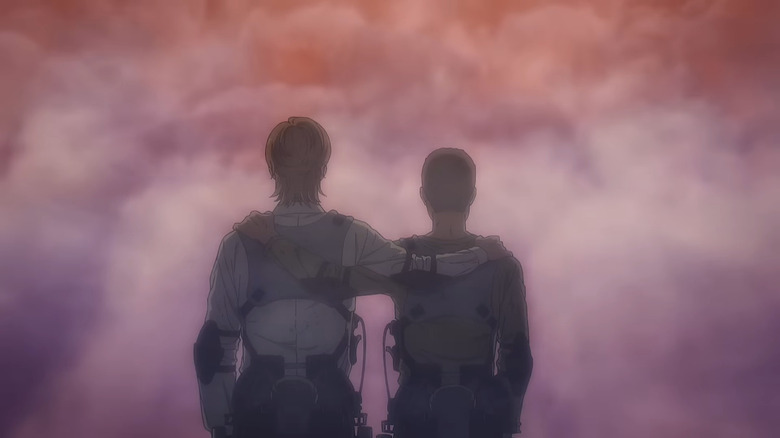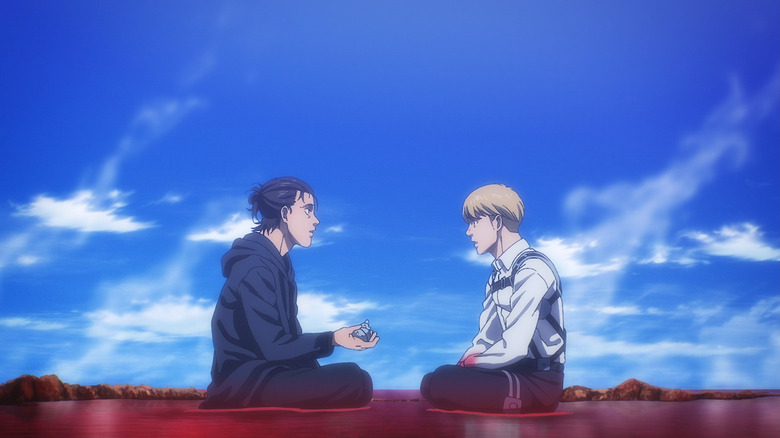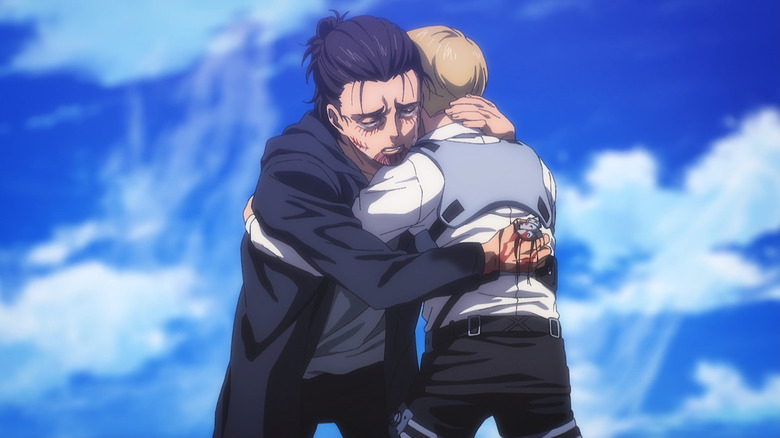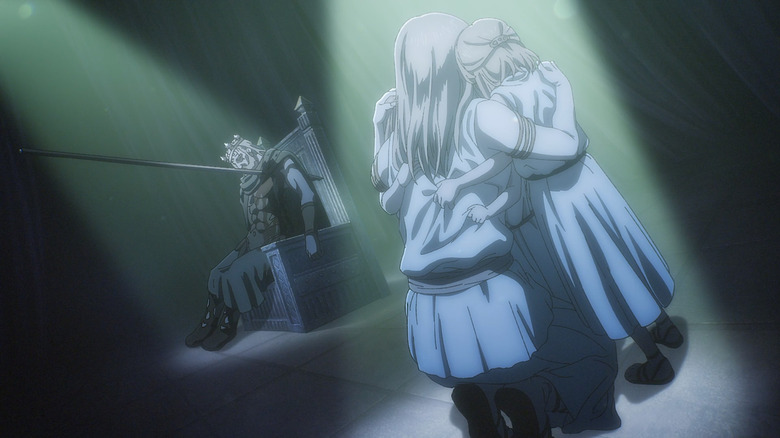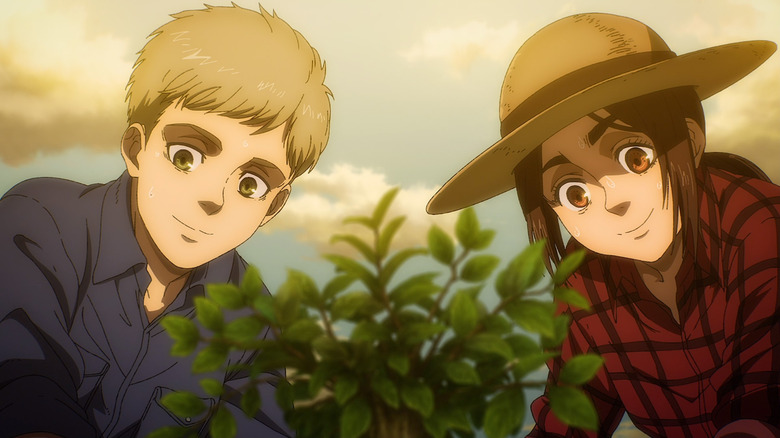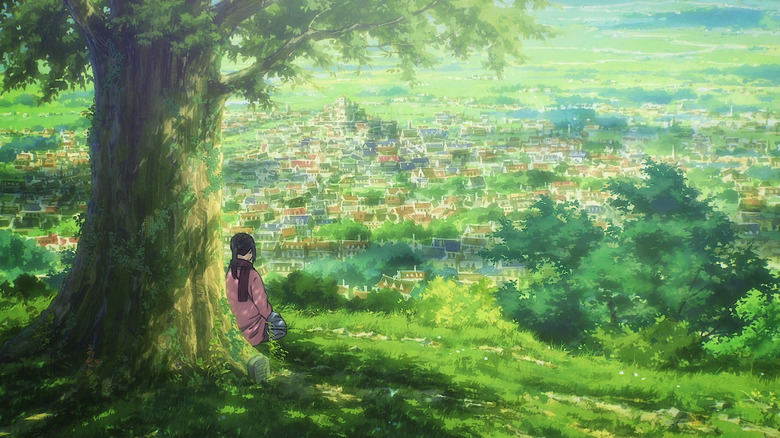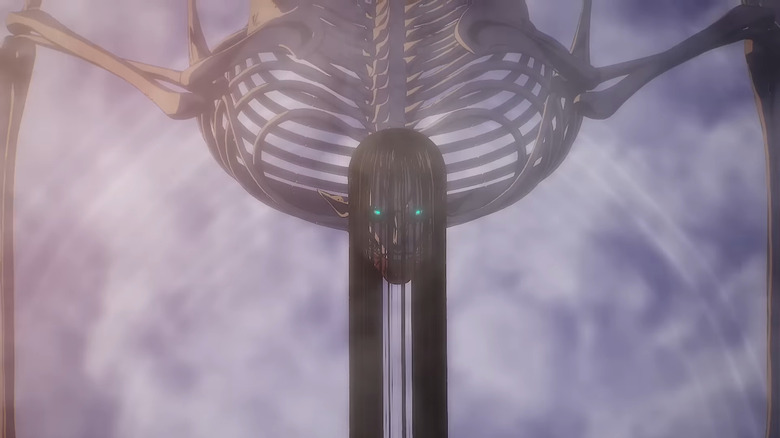Attack On Titan Ending Explained: The Epic Anime Gets The Ending It Deserves
The final episode of "Attack on Titan" is finally here, bringing to an end an epic 10-year anime that changed the industry and fandom. This is the defining anime of this generation, one that broke into the mainstream and became a global phenomenon.
After a "Final Season" that lasted three years, "Attack on Titan Final Season: The Final Chapters, Special 2" (yes, that's the actual title) concludes the story with an epic feature-length finale. It is full of action, twists and turns, and emotional gut-punches. It is the perfect ending to the show, and the only possible conclusion.
If you've never watched "Attack on Titan," I urge you to stop reading right now. There are obviously heavy spoilers ahead, and we're going to dive right into the show's ending without much of a recap of what came before. If you are curious about what all the fuzz is about, go here to read why you should catch up on the biggest anime of the past decade even if you've never watched a single anime.
This is the anime that started my journey on this very site, the anime that kickstarted a still ongoing column highlighting the medium. It brings me nothing but joy to see "Attack on Titan" end in such a satisfying way and to close the chapter on this anime by breaking down its epic finale.
The Battle of Heaven and Earth
"Attack on Titan" became a very different show in its final season. Eren Jaeger, once a hero, unleashed an army of Titans to destroy the world. Only his former friends and his former enemies, working together, are capable of stopping The Rumbling and saving what's left of humanity. The final episode begins with the final alliance arriving on top of Eren's massive Attack Titan. Their goal is to find Eren's brother Zeke, whose power allows Eren to control all Titans, and end this reign of terror by killing Eren.
Of course, it is easier said than done. As soon as they arrive, the group is attacked by dozens of resurrected Titans of old, made from the powers of the Warhammer Titan. We see dozens of Armored Titans of all shapes and sizes, Warhammer Titans wielding swords, crossbows, and other weapons. There are even several different Beast Titans taking different animal shapes, from an okapi to a crocodile and even a dog — no doubt a very good boy.
In between cool fight scenes, we also see Titans around the world trampling everything. What looks like India, London, and Tokyo are obliterated. There's even a gut punch of a scene where people are running away from Titans and edging closer to a cliff. A mother throws her baby up in the air just as she plummets, and the surrounding adults begin to crowd surf the child forward, keeping it alive even for a moment longer. Making it more emotional, the scene is animated as a homage to "Schindler's List," completely black and white except for the red blanket wrapping the baby.
What happened at the end of Attack on Titan?
It takes the combined efforts of not just the alliance we've been following for a while now (including Falco and his cool, newfound ability to fly), but even Armin convincing Zeke and the deceased Titan users we've met throughout the show (Bertholdt, Ymir, Porco and Marcel, even Eren's dad) to cancel the apocalypse. What follows is a truly epic battle involving dozens of Titans, an apocalyptic sight worthy of the big screen.
Zeke, finally free from Eren's grasp, shows up and calls out to Levi. This allows him to finally fulfill his promise to Erwin and cut out the Beast Titan's head, bringing the Rumbling to an end. He even gets a moment to reflect and finally forgive himself for picking Armin instead of Erwin. He realizes Armin is the right person to lead the Scouts in the final fight, as he shares the same desire for knowledge and understanding that always drove the Scouts forward.
Every single character gets a moment to shine and to fulfill their arcs. Levi fulfills his last order and finds peace, finally free from having to be a soldier. Armin becomes the perfect embodiment of the Scouts and leads even the dead in one final fight. Even Reiner, the man who was always forced to become a weapon for others, is tasked not with killing Eren, but with being the final line of defense for all humanity. He is the shield that guards his comrades as they finish the job, the one that protects humanity at large from the Founding Titan.
What was Eren's actual plan?
Of course, there's also Eren to deal with. After a fantastic and titanic brawl between Armin and Eren in colossal form, it falls on none other than Mikasa to deliver the killing blow and end Eren's life. It always had to be her, and she does it without letting go of her love for Eren. With his death, the power of the Titans ends forever.
After the killing blow, we flash back to right before the final assault, as Armin and the rest of the main characters all seemingly had conversations with Eren. He erased these conversations with the power of the Founder and only unlocked them upon his death.
After years of speculation on what Eren's plan was, and how much he actually planned ahead, we finally get a clear answer from the man himself. Turns out, he did pull a Lelouch and set out to make himself the bad guy that unites humanity, while his friends turn into the heroes that saved the world by killing him. His plan and foresight calculated that 80% of humanity would perish. He even admits this would not really end war or hatred, but hey, at least the outside world will be about as big as the world inside the walls so the playing field is leveled.
This was a very polarizing scene when the manga first came out. Poor fan translations and a lack of media literacy had fans debating whether the story painted Eren as a tragic hero, and Armin as grateful for Eren's actions and supporting of them.
A garden-variety idiot
The anime could not be clearer on its stance. Eren was never a genius or a tragic hero. He still chose this. This is essentially Eren's version of Walter White's "I did it for me" speech. He wanted to level everything and see an empty world like the one he saw in Armin's books. For his part, Armin takes part of the blame. It was he who put the idea of an unoccupied empty world in Eren's head. He killed thousands and led Eren to annihilate most of humanity. Eren didn't do this alone — they did this together. Armin doesn't thank Eren for being a mass murderer, but he does take responsibility and tells his friend they'll see each other again in hell, suffering for their sins together.
Ultimately, Eren was never a complex character. As he tells Armin, he was always just "a garden-variety idiot who got his hands on power." This is why he got a mini existential crisis in season 3. Eren realized he wasn't some chosen one, but an average kid with extraordinary powers. Much like "Dune," this story is a warning against turning people into messiahs, against giving people godlike powers and expecting them to remain human. In his final moments, Eren turns into a pathetic and petulant child who cares more about Mikasa not moving on after his death than about his crimes. He never really matured, and he chose to become an absolute monster rather than grow out of his childish vow of "destroying his enemies."
Armin recognizes the humanity in Eren, that he could do such horrible things and still try to rationalize it through his love of friends. He doesn't forgive Eren, but he understands him and recognizes some of Eren in himself, too.
The girl and the Titan
Warning: this section mentions sexual assault.
There's another big figure whose motivations were unclear until now — Ymir. Though we had seen her backstory, and we seemingly saw her agree with Eren's proposal of killing all of humanity in past episodes, we learn most about her motivations in the finale.
As Eren tells Armin, the reason she was bound to the will of the royal family; the reason she spent 2000 years creating Titans was because she truly and genuinely loved King Fritz — the guy who cut out her tongue, killed her family, held her as a slave and raped her since she was a child. Even if the episode doesn't have Ymir talk about her true intentions, it doesn't take that "love" at face value. Mikasa tells Ymir that her love is an agonizing nightmare. It isn't that she felt love and devotion toward her abuser, but that Ymir struggled with reconciling the monster with the gifts it gave her — children, and an entire race of descendants she could call family and be with forever.
This becomes clear when Zeke, talking to Armin about the alien-looking worm that is the source of the Titan powers, says all Ymir wanted was fellowship, love, and to be free of fear. Through her power, Ymir was an undying force surrounded by all her children. There is no rational way to explain her existence or how the unspeakable horrors she lived through shaped her understanding of love. Only Ymir can answer that. But we do get a hint when, as Mikasa kills Eren and destroys the power of the Titans, we see Ymir seemingly picturing what could have been — her choosing to stay with her daughters and let an assassin's spear kill her abuser.
What happened next?
As Eren predicted, his Rumbling allowed his friends to live long lives free of walls. Mikasa grows old and has a family, Levi is no longer a pure killing machine. But Eldia did turn into a fascistic military state in Eren's name. What's worse, war didn't end. Sure, Paradis Island thrived for years, maybe even centuries. Buildings rose and a futuristic landscape was erected where before only walls stood, but the fighting kept going, and eventually nuclear war obliterated everything and everyone on the island. The cycle of hatred and war continued because, as Erwin said way back in season 3, "Peace between man will never be certain, not until our numbers fall to one or less."
So, no. Eren was no hero. His actions did not save the world. His sacrifice, his sins, and his crimes were never and will never be worth it, because there is nothing that can ever justify genocide. Old grudges grow into hatred, and into fear. Borders and ideologies get reinforced and eventually turn to violence. Humanity kept coming up with new weapons until they eclipsed even the power of the Titans.
But at the end of it all, there is still hope. A shot of a single boy and his dog walking through the desolated and forested ruins that was once Shiganshina, the town where it all began. A boy coming across the tree where Eren and Mikasa were buried. Life goes on, even despite the pain.
What the ending of Attack on Titan means
As critic James Beckett wrote in his review for Anime News Network, "'Attack on Titan' isn't so much about war as it is resigned to the destruction that people will never fail to inflict on each other, for whatever reasons they can conjure up." This show always dealt with war, but it was never its focus except to portray it as the inevitable conclusion of humanity being driven by fear of the other, by hatred of that which is different.
If nothing else, the finale makes it clear that this show was ultimately always about how we can find love amidst hatred. It was about how we can find hope in despair, and how we can learn to live with each other despite how much harm we can do to one another. That's why it was always going to be Mikasa, the emotionless, cold killer who would end Eren. Despite the violence, despite the horror, she still managed to share a melancholic smile as she killed the man she loved.
It is why the characters of Gabi and Falco were so important to the story, why we had to see Gabi kill a beloved character, and commit violent acts out of sheer fear of the world's hatred. It was all so we could get a final image of the two kids simply planting a tree to help heal the world. This was never a story about a kid who gains the power to crush his enemies. It was always a story about whether we could find small moments of peace and happiness in a cruel and violent world.
What the crew has said about the Attack on Titan ending
In an interview with The New York Times, manga creator Hajime Isayama talked about coming up with the ending from the very beginning, wanting to tell the story of a "victim who then goes through this story and becomes the aggressor." Curiously, he draws a parallel between Eren being sort of forced into a path because of his powers, and his own career as a manga artist. Because he had already come up with the ending, he felt forced into writing toward that conclusion:
"It would have been nice if I could have changed the ending. Writing manga is supposed to be freeing. But if I was completely free, then I should have been able to change the ending. I could have changed it and said I wanted to go in a different direction. But the fact is that I was tied down to what I had originally envisioned when I was young. And so, manga became a very restrictive art form for me, similar to how the massive powers that Eren acquired ended up restricting him."
According to Isayama, there was never a chance the story ended without war continuing after Eren's death. "The end of fighting and the end of contention itself kind of seems hokey," he said. "It kind of seems like it's not even believable. It's just not plausible in the world we're living in right now. And so, sadly, I had to give up on that kind of happy ending."
"Attack on Titan" ended just as it began, with brutal violence, some great action, and moments of joy amidst the horror.
